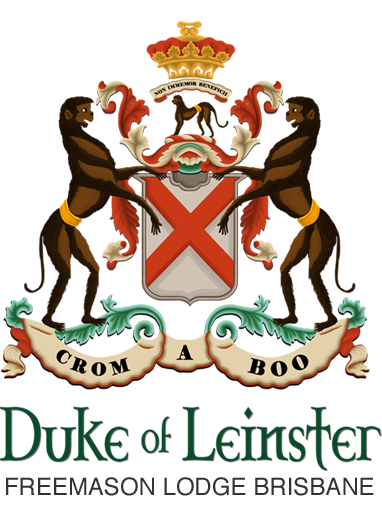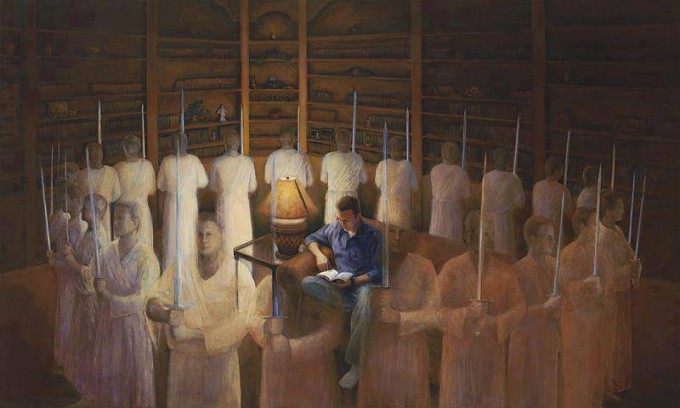Taken from: C.G. Jung, CW 18, The Symbolic Life, Chapter III
(And a tip of the hat to our erudite Brother from Southern Queensland Lodge, No. 29, UGLQ for originally posting this information and bringing it to our attention)
“You see, man is in need of a symbolic life – badly in need. We only live banal, ordinary, rational, or irrational things . . . but we have no symbolic life. Where do we live symbolically? Nowhere except where we participate in the ritual of life. . . .
Have you got a corner somewhere in your house where you perform the rites, as you can see in India? Even the very simple houses there have at least a curtained corner where the members of the household can perform the symbolic life, where they can make their new vows or their meditation. We don’t have it; we have no such corner. We have our own room, of course, – but there is a telephone that can ring us up at any time, and we always must be ready. We have no time, no place.
We have no symbolic life, and we are all badly in need of the symbolic life. Only the symbolic life can express the need of the soul – the daily need of the soul, mind you! And because people have no such thing, they can never step out of this mill – this awful, banal, grinding life in which they are “nothing but.” . . . Everything is banal; everything is “nothing but,” and that is the reason why people are neurotic. They are simply sick of the whole thing, sick of that banal life, and therefore they want sensation. They even want a war; they all want a war; they are all glad when there is a war; they say, “Thank heaven, now something is going to happen – something bigger than ourselves!”
These things go pretty deep, and no wonder people get neurotic. Life is too rational; there is no symbolic existence in which I am something else, in which I am fulfilling my role, my role as one of the actors in the divine drama of life.
I once had a talk with the master of ceremonies of a tribe of Pueblo Indians, and he told me something very interesting. He said, “Yes, we are a small tribe, and these Americans, they want to interfere with our religion. They should not do it,” he said, “because we are the sons of the Father, the Sun. He who goes there” (pointing to the sun) — “that is our Father. We must help him daily to rise over the horizon and to walk over heaven. And we don’t do it for ourselves only; we do it for America; we do it for the whole world. And if these Americans interfere with our religion through their missions, they will see something. In ten years Father Sun won’t rise anymore because we can’t help him any more.”
Now, you may say, that is just a sort of mild madness. Not at all! These people have no problems. They have their daily life, their symbolic life. They get up in the morning with a feeling of their great and divine responsibility; they are the sons of the Sun, the Father, and their daily duty is to help the Father over the horizon – not for themselves alone, but for the whole world. You should see these fellows; they have a natural fulfilled dignity. And I quite understand when he said to me, “Now look at these Americans; they are always seeking something. They are always full of unrest, always looking for something. What are they looking for? There is nothing to be looked for!” That’s perfectly true. You can see them, these traveling tourists, always looking for something, always in thee vain hope of finding something. On my many travels I have found people who were on their third trip around the world – uninterruptedly. Just traveling, traveling; seeking, seeking. I met a woman in central Africa who had come up alone in a car from Cape Town and wanted to go to Cairo. “What for?” I asked. “What are you trying to do that for?” And I was amazed when I looked into her eyes — the eyes of a hunted, a cornered animal — seeking, seeking, always in the hope of something. I said, “What in the world are you seeking? What are you waiting for? What are you hunting after?” She is nearly possessed; she is possessed by so many devils that chase her around. And why is she possessed? Because she does not live the life that makes sense. Hers is a life utterly, grotesquely banal, utterly poor, meaningless, with no point in it at all. If she is killed today, nothing has happened, nothing has vanished – because she was nothing! But if she could say, “I am the daughter of the Moon. Every night I must help the moon, my Mother, over the horizon” – ah, that is something else! Then she lives; then her life makes sense, and makes sense in all continuity, and for the whole of humanity. That gives peace, when people feel that they are living the symbolic life, that they are actors in the divine drama. That gives the only meaning to human life; everything else is banal and you can dismiss it. A career, producing of children, are all maya compared with that one thing, that your life is meaningful
….
What I have spoken of is, alas, to a great extent the past. We cannot turn the wheel backwards; we cannot go back to the symbolism that is gone. No sooner do you know that this thing is symbolic than you say, “Oh, well, it presumably means something else.” Doubt has killed it, has devoured it. So you cannot go back. . . . My psychological condition wants something else. I must have a situation in which that thing becomes true once more. I need a new form. When one has had the misfortune to be fired out of a church, or to say, “This is all nonsense,” and to quit it – that has no merit at all. But to be in it and to be forced, say, by God to leave it – well, then you are legitimately extra ecclesiam. But extra ecclesiam nula salus; then things really become terrible because you are no more protected, you are no more in the consensus gentium, you are no more in the lap of the all-compassionate Mother. You are alone and you are confronted with all the demons of hell. That is what people don’t know. Then they say you have an anxiety neurosis, nocturnal fears, compulsions – I don’t know what. Your soul has become lonely; it is extra ecclesiam and in a state of no-salvation. And people don’t know it. They think your state is pathological, and every doctor helps them to believe it. And, of course, when they say, and everybody holds, that this is neurotic and pathological, then we have to talk that language. I talk the language of my patients. When I talk with lunatics, I talk the lunatic language, otherwise they don’t understand me. And when I talk with neurotics, I talk neurotic with them. But it is neurotic to talk when one says that this is a neurosis. As a matter of fact it is something quite different; it is the terrific fear of loneliness. It is the hallucination of loneliness, and it is a loneliness that cannot be quenched by anything else. You can be a member of a society with a thousand members, and you are still alone. That thing in you which should live is alone; nobody touches it, nobody knows it, you yourself don’t know it; but it keeps on stirring, it disturbs you, it makes you restless, and it gives you no peace.
. . .
From my observations I learned that the modern unconscious has a tendency to produce a psychological condition which we find, for instance, in medieval mysticism. You find certain things in Meister Eckhart; you find many things in Gnosticism; that is a sort of esoteric Christianity. You find the idea of the Adam Kadmon in every man – the Christ within. Christ is the second Adam, which is also, in exotic religions, the idea of the Atman or the complete man, the original man, the “all-round” man of Plato, symbolized by a circle or a drawing with circular motifs. You find all these things in medieval mysticism; you find them all through alchemical literature, beginning with the first century after Christ. You find them in Gnosticism, you find many of them in the New Testament, of course, in Paul. But it is an absolutely consistent development of the idea of the Christ within; and the argument is that it is absolutely immoral to allow Christ to suffer for us, that he has suffered enough, that we should carry our own sins for once and not shift them off onto Christ – that we should carry them all. Christ expresses the same idea when he says, “I appear in the least of your brethren”; and what about it . . . if the least of your brethren should be yourself – what about it then? Then you get the intimation that Christ is not to be the least in your life, that we have a brother in ourselves who is really the least of our brethren, much worse than the poor beggar whom you feed. That is, in ourselves we have a shadow; we have a very bad fellow in ourselves, a very poor man, and he has to be accepted. What has Christ done – let us be quite banal about it – what has Christ done when we consider him as an entirely human creature? Christ was disobedient to his mother; Christ was disobedient to his tradition; . . .[but] he carried through his hypothesis to the biter end. How was Christ born? In the greatest misery. Who was his father? He was an illegitimate child – humanly the most miserable situation: a poor girl having a little son. That is our symbol, that is ourselves; we are all that. And if anyone lives his own hypothesis to the bitter end (and pays with his death, perhaps), he knows that Christ is his brother.
That is modern psychology, and that is the future. That is the true future, that is the future of which I know but, of course, the historical future might be quite different. . . . But I do not care for a historic future at all; I am not concerned with it. I am only concerned with the fulfillment of that will that is in every individual. My history is only the history of those individuals who are going to fulfill their hypotheses. That is the whole problem; that is the problem of the true Pueblo: that I do today everything that is necessary so that my Father can rise over the horizon. That is my standpoint”. – (C.G. Jung, CW 18, The Symbolic Life, Chapter III. “The Symbolic Life,” § 625 – 630, 632, 638, & 639.)





